

Arms Trade. ORGAN TRAFFICKING.
Testing drugs on poors. The Dark Side of Globalization: Why Seattle's 1999 Protesters Were Right - Noah Smith. The WTO demonstrators were the "Occupy" movement of the late-20th century—mocked, maligned, and mostly right.
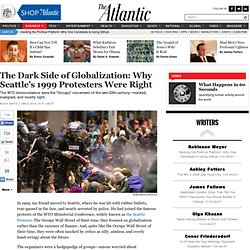
In 1999, my friend moved to Seattle, where he was hit with rubber bullets, tear-gassed in the face, and nearly arrested by police. He had joined the famous protests of the WTO Ministerial Conference, widely known as the Seattle Protests. The Occupy Wall Street of their time, they focused on globalization rather than the excesses of finance. And, quite like the Occupy Wall Street of their time, they were often mocked by critics as silly, aimless, and overly hand-wringy about the future. The organizers were a hodgepodge of groups—unions worried about competition from cheap foreign labor, environmentalists worried about the outsourcing of polluting activities, consumer protection groups worried about unsafe imports, labor rights groups worried about bad working conditions in other countries, and leftists of various stripes simply venting their anger at capitalism.
Live With It. Pollution has damaged Chinese sperm so much that a black-market shot costs up to $4,900. China’s finally starting to reckon with the health consequences of decades of pollution. An official at the top economic planning agency just acknowledged pollution’s toll on people’s mental and physical health. But for many, that’s too little too late. Such as for China’s youngest lung cancer patient (link in Chinese), an 8 year old girl. And for the 40 million people between 20 and 40—about 12.5% of that population—who have fertility problems. It’s also why Chinese men are increasingly shooting blanks (link in Chinese), says Dr.
The HIV rebound nobody is discussing. Hawa Abdallah works in a brothel in Tanzania's largest city, where a third of sex workers are infected with HIV.
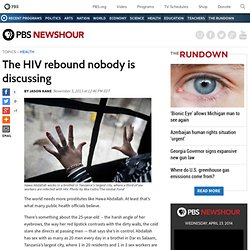
Photo by Mia Collis/The Global Fund The world needs more prostitutes like Hawa Abdallah. At least that’s what many public health officials believe. "Everything is amazing and nobody is happy" Measuring materialism in children's books. (Phys.org) —Rachel Franz has read more than her share of books to young children growing up next to a daycare center, babysitting neighborhood children and working as a nanny.
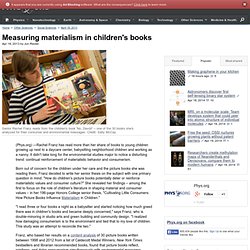
It didn't take long for the environmental studies major to notice a disturbing trend: continual reinforcement of materialistic behavior and consumerism. Born out of concern for the children under her care and the picture books she was reading them, Franz decided to write her senior thesis on the subject with one primary question in mind: "How do children's picture books potentially deter or reinforce materialistic values and consumer culture? " She revealed her findings – among the first to focus on the role of children's literature in shaping material and consumer values – in her 196-page Honors College senior thesis, "Cultivating Little Consumers: How Picture Books Influence Materialism in Children.
" Coding consumerism Putting research into practice.
Organ Trade. Narco-insurgency. Crime & traffics. The Pearl River Delta: A City of Cities. Earlier this year the British Telegraph Newspaper published a story about the creation of a new megacity in the Chinese Pearl River delta region.
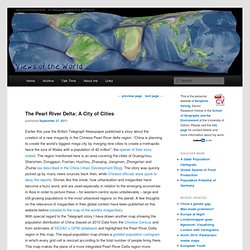
“China is planning to create the world’s biggest mega city by merging nine cities to create a metropolis twice the size of Wales with a population of 42 million”, the opener of their story stated. The region mentioned here is an area covering the cities of Guangzhou, Shenzhen, Donggaun, Foshan, Huizhou, Zhaoqing, Jiangmen, Zhongshan and Zhuhai (as described in the China Urban Development Blog). The story was quickly picked up by many news sources back then, while Chinese officials were quick to deny the reports. Stories like this show, how urbanisation and megacities have become a buzz word, and are used especially in relation to the emerging economies in Asia in order to picture these – for western-centric eyes unbelievably – large and still growing populations in the most urbanised regions on the planet.
(click for larger map) A smart member of the global warrior elite “discovers” the next big threat. “So, where else are you applying?”
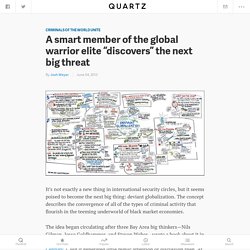
Good news for applicants: that’s no longer allowed. New federal rules, announced Sept. 14, prohibit colleges from peeking at kids’ financial aid forms to see where else they’re applying, and the National Association for College Admission Counseling (NACAC) barred member colleges from directly asking, too, earlier this month. But it’d be wrong to think this means colleges won’t get an extensive amount of other data on their applicants. As a Sept. 28 story in the Chronicle of Higher Education (paywall) noted, colleges are increasingly trying out new practices—and new tools—to “get inside” students’ minds. Some schools tally how many times an applicant visits its web site; others sell themselves with personally targeted messages. Several of these practices toe an ethical line. Creeping competition… A handful of decades ago, an applicant’s visit to a college campus was a surefire sign of interest. But the nature of the game has changed.